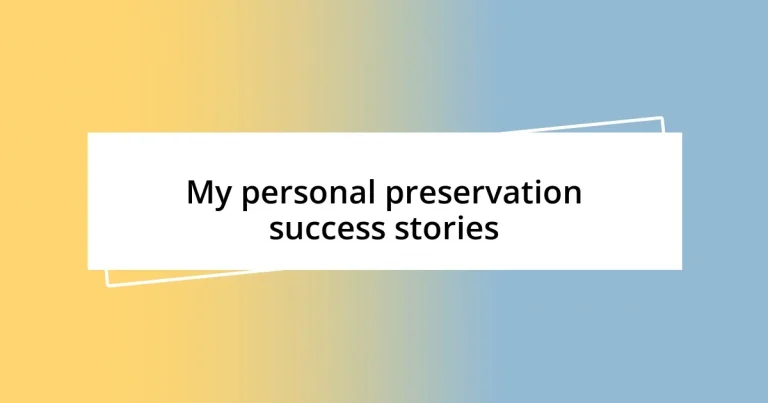Key takeaways:
- Recognizing the need for personal care is a crucial first step in reclaiming one’s time and peace amidst daily responsibilities.
- Establishing boundaries, engaging in mindful activities, and maintaining gratitude are essential strategies for fostering emotional well-being.
- Adopting a flexible mindset, practicing self-compassion, and viewing challenges as learning opportunities contribute significantly to personal preservation and growth.
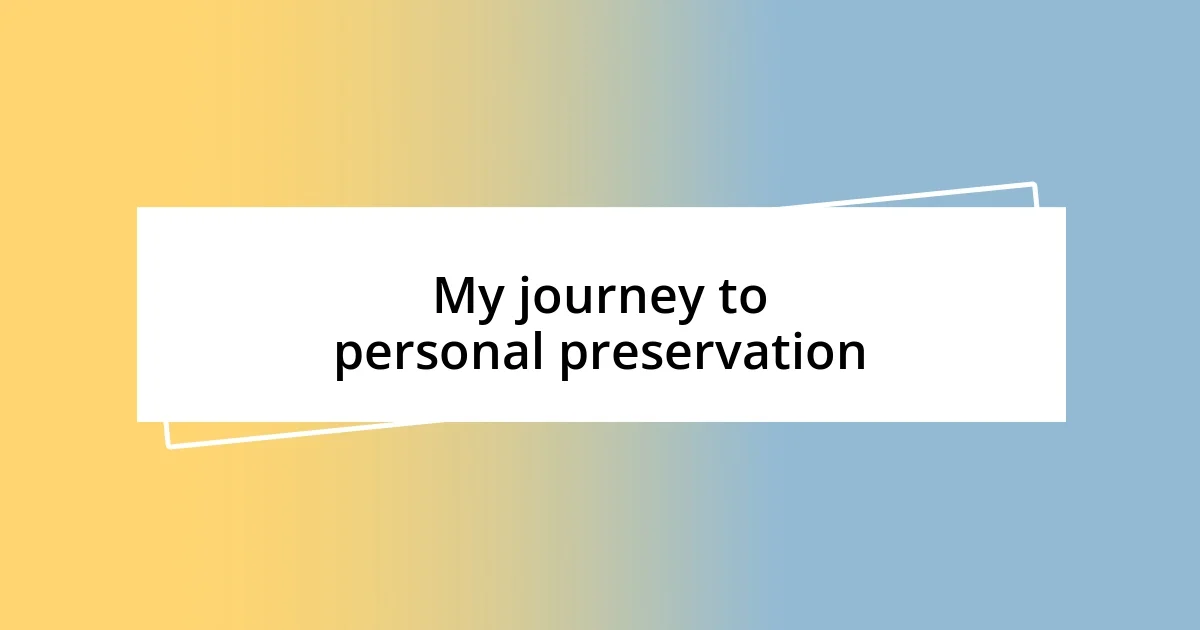
My journey to personal preservation
My journey to personal preservation began with a moment of realization. I vividly remember sitting in my car, exhausted from the rush of daily life, when it struck me: I was so busy taking care of everyone else that I had forgotten about myself. Have you ever felt that way? It’s a wake-up call many of us can relate to.
As I sought balance, I started small, prioritizing self-care rituals that made a difference. One chilly afternoon, I decided to take a walk in the park, letting the crisp air fill my lungs. That brief escape brought clarity I hadn’t experienced in months. It was my first step in reclaiming my time and my peace. Have you tried something similar to reconnect with yourself?
Over the years, I discovered that personal preservation is an ongoing process, much like tending a garden. I began unfurling layers of stress, planting seeds of mindfulness, and nurturing my emotional well-being. I still remember the day I set boundaries in my relationships for the first time; it felt both liberating and terrifying. Isn’t it remarkable how saying “no” can be an essential part of saying “yes” to ourselves?
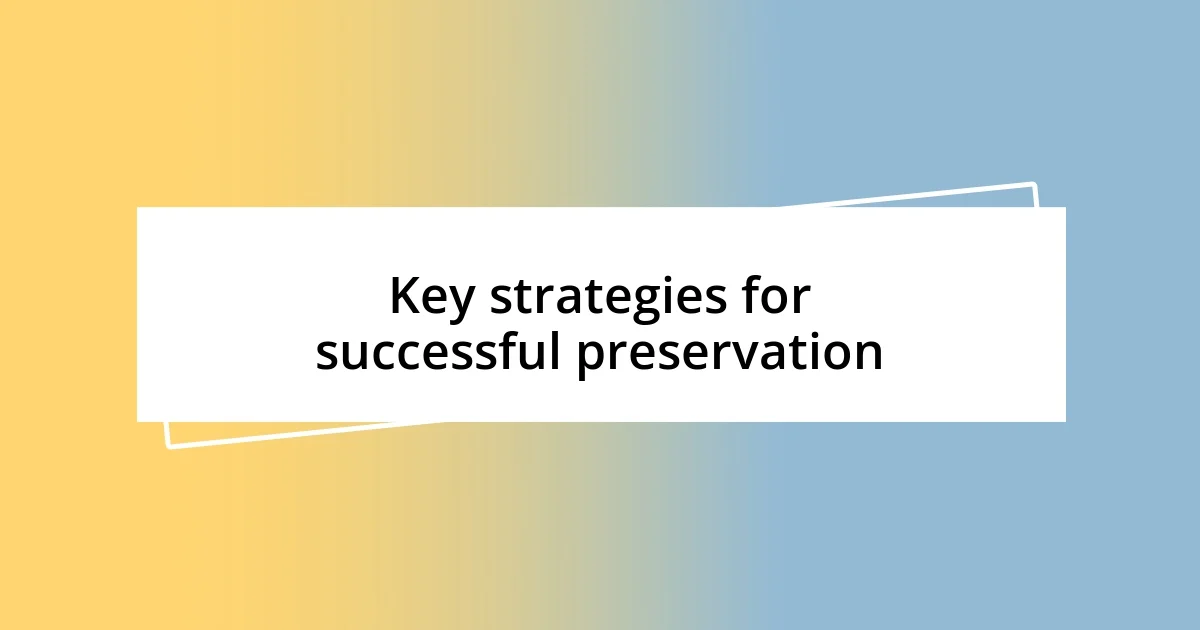
Key strategies for successful preservation
Finding effective strategies for successful personal preservation is essential. For me, one key approach has been establishing a routine that prioritizes my well-being. I recall a particularly hectic week when I felt overwhelmed. In response, I carved out intentional time each morning for meditation and journaling. That simple practice transformed my day and fostered a newfound clarity that resonated throughout my week.
Here are some key strategies that can help enhance your preservation journey:
- Schedule Regular Check-ins: Set aside time each week to evaluate your mental and emotional state.
- Create Boundaries: Learn to say no; it’s a crucial step in protecting your time and energy.
- Engage in Mindful Activities: Explore practices like yoga or art, which encourage presence and self-expression.
- Connect with Nature: Regular walks outdoors can soothe your mind and rejuvenate your spirit.
- Cultivate Supportive Relationships: Surround yourself with people who uplift and support your journey.
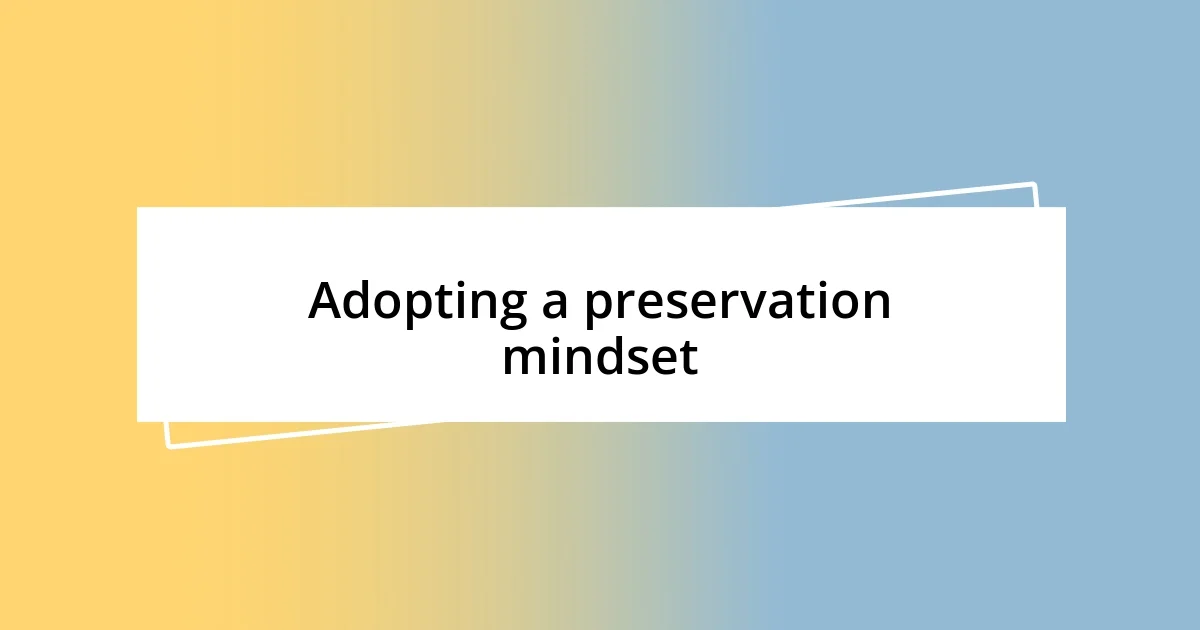
Adopting a preservation mindset
Adopting a preservation mindset requires a shift in how we view ourselves in the context of our daily lives. I remember one evening when I sat down with my favorite herbal tea, reflecting on how I frequently put others’ needs before my own. It was then that I realized that nurturing myself wasn’t selfish; it was necessary. Shifting my perspective in this way was eye-opening.
As I embraced this new mindset, I made it a ritual to list three things each day that nourished my spirit. One day, I vividly noted the joy I felt while painting, even if it was just a simple landscape. That moment of creation not only relaxed me but also reminded me of the joy hidden in my hobbies. It’s amazing how embracing what makes us happy can serve as a lifeline in stressful times.
Over time, I also identified the importance of gratitude in my preservation mindset. Keeping a gratitude journal helped me appreciate the small moments, whether it was a kind comment from a friend or watching a sunset. This practice continually grounds me and serves as a reminder that taking care of myself is a vital part of living a fulfilling life. How do you celebrate the little victories in your day?
| Previous Mindset | Adoption of Preservation Mindset |
|---|---|
| Self-neglect | Active self-care |
| Overcommitment to others | Establishing boundaries |
| Ignoring joy | Embracing hobbies |
| Short-term stress relief | Long-term emotional health |
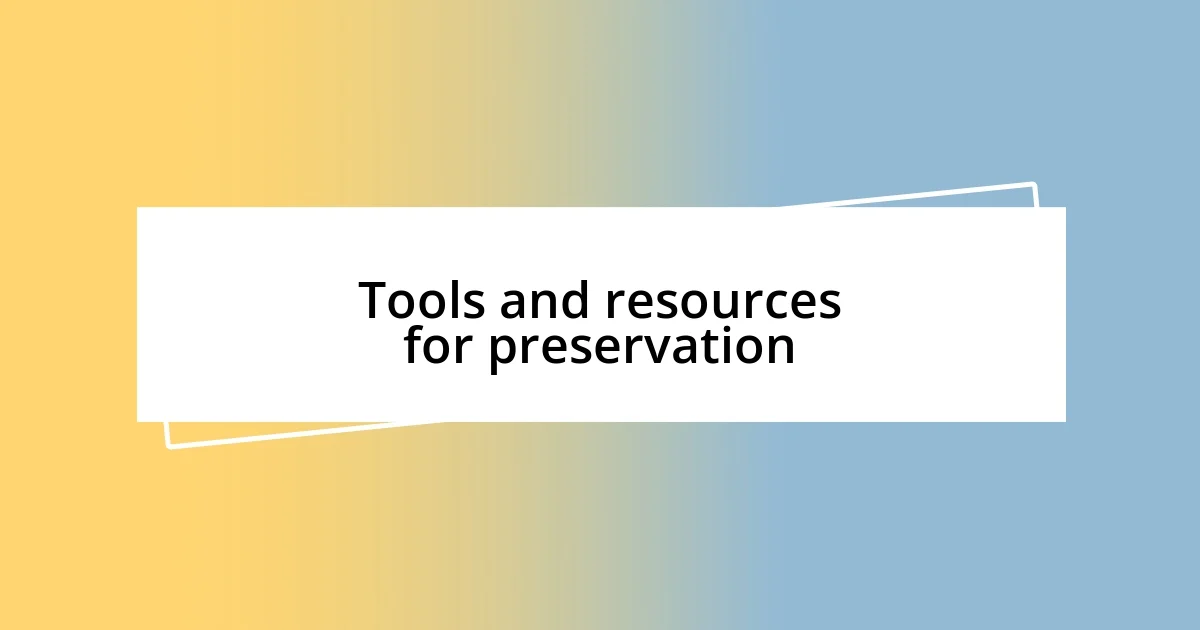
Tools and resources for preservation
When it comes to tools and resources for preservation, I’ve found that digital planners make a significant difference in staying organized and mindful. For instance, using apps like Notion or Todoist has helped me prioritize my mental health tasks alongside daily responsibilities. Have you ever tried tracking your wellness goals digitally? It’s amazing how a simple visual reminder can keep you focused and motivated.
Another resource that really resonated with me is the power of guided meditation apps. I remember the first time I used Headspace during a particularly stressful afternoon; the calming voice and soothing background sounds made it feel like I had my personal wellness coach right beside me. Tools like these remind me to take a step back, breathe, and reconnect with my inner self. Have you explored any mindfulness apps that could enhance your preservation journey?
Books on emotional intelligence, like “Emotional Intelligence 2.0,” have also been invaluable. They not only offer insightful strategies but also challenge me to reflect on my emotional responses. I recall diving into its chapters after a difficult week, and how these insights guided me in navigating conversations more effectively. What literature have you turned to when you need guidance or support on your preservation path? Engaging with such resources can truly enrich your journey and deepen your understanding of self-care principles.
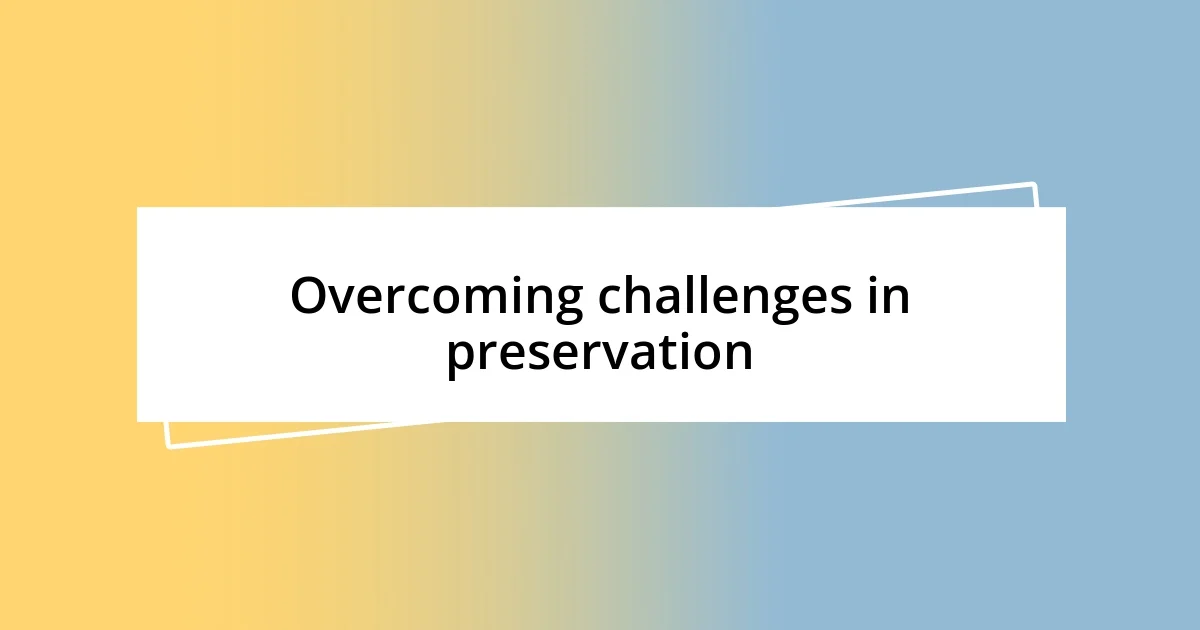
Overcoming challenges in preservation
Overcoming challenges in preservation often comes down to resilience. I once found myself overwhelmed by balancing a demanding job and the need for self-care. It felt like I was constantly running on empty until one day, I decided to schedule “me time” just as I would a key meeting. That simple act changed everything; I learned to prioritize myself, and it became easier to tackle my responsibilities without feeling burnt out.
There are moments, though, when setbacks can feel disheartening. I vividly recall an incident when I aimed to implement a new self-care practice, only to drop the ball after a week. Instead of viewing this as failure, I reframed it as a learning opportunity. This perspective shift spurred me to refine my approach and choose practices that felt more aligned with who I am, such as integrating short, revitalizing walks into my daily routine. How do you handle slip-ups in your preservation journey?
I’ve also discovered the importance of seeking support from others when facing preservation challenges. I used to think I had to navigate everything alone, but sharing my struggles with friends and family opened doors to fresh perspectives and encouragement. Last month, sharing my feelings about a particularly challenging week led to a meaningful conversation with a friend who had faced similar issues. This not only strengthened our bond but reignited my motivation to keep pursuing my self-care goals. Have you reached out to someone when things get tough? It can really make a difference.
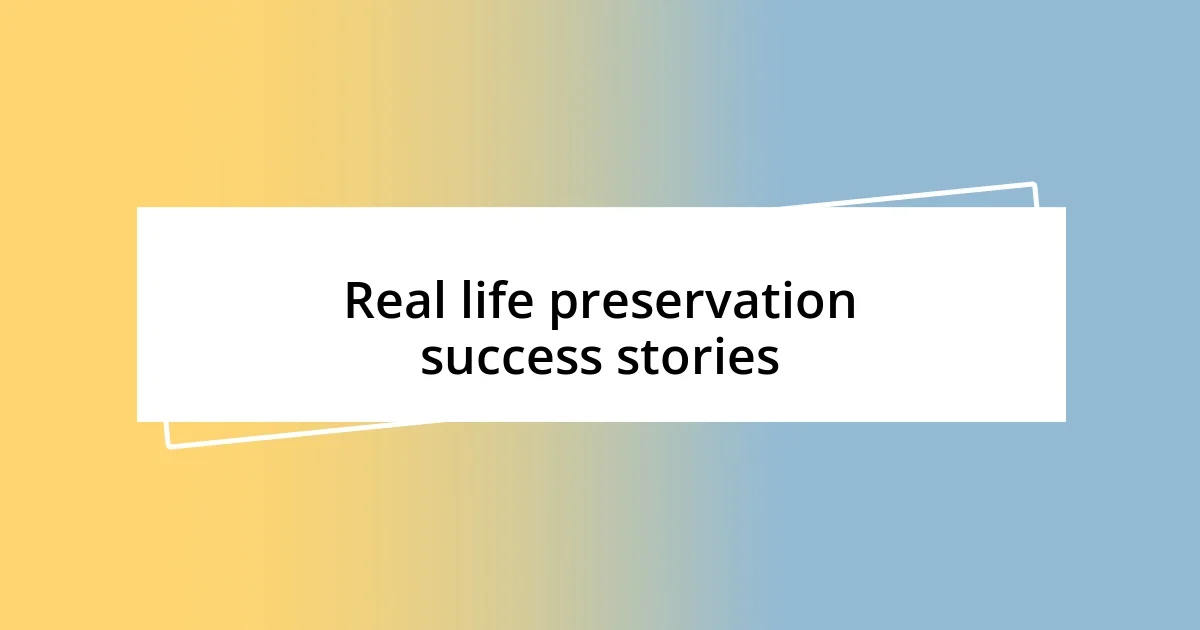
Real life preservation success stories
Real life preservation success stories often come from unexpected places. I remember a time when I challenged myself to limit my social media use. What started as a week-long experiment turned into months of profound clarity and peace. During that time, I filled my hours with reading and connecting with nature, and it was like I had awakened from a fog. Have you ever taken a break from digital distractions? It’s remarkable what you can discover about yourself.
One particularly inspiring story comes from a friend of mine who opened a community garden in a local park. This project not only beautified the neighborhood but also created a space for people to gather, share, and nurture both plants and friendships. As she involved herself in the garden, she found a renewed sense of purpose and well-being. Seeing how her initiative transformed the lives of many around her was a powerful reminder of how collective efforts can lead to individual growth. Have you thought about starting a small community project? It could be a wonderful way to foster connection and personal preservation.
I’ve also found success in small rituals that have transformed my day-to-day life. For example, I began a morning routine of writing down three things I’m grateful for each day. This practice shifted my focus from daily stressors to the positives surrounding me. I was surprised at how this small commitment cultivated a more optimistic outlook and a deeper appreciation for life’s simple joys. What little routines have you experimented with to enhance your daily life? Sometimes those small changes can lead to profound transformations.
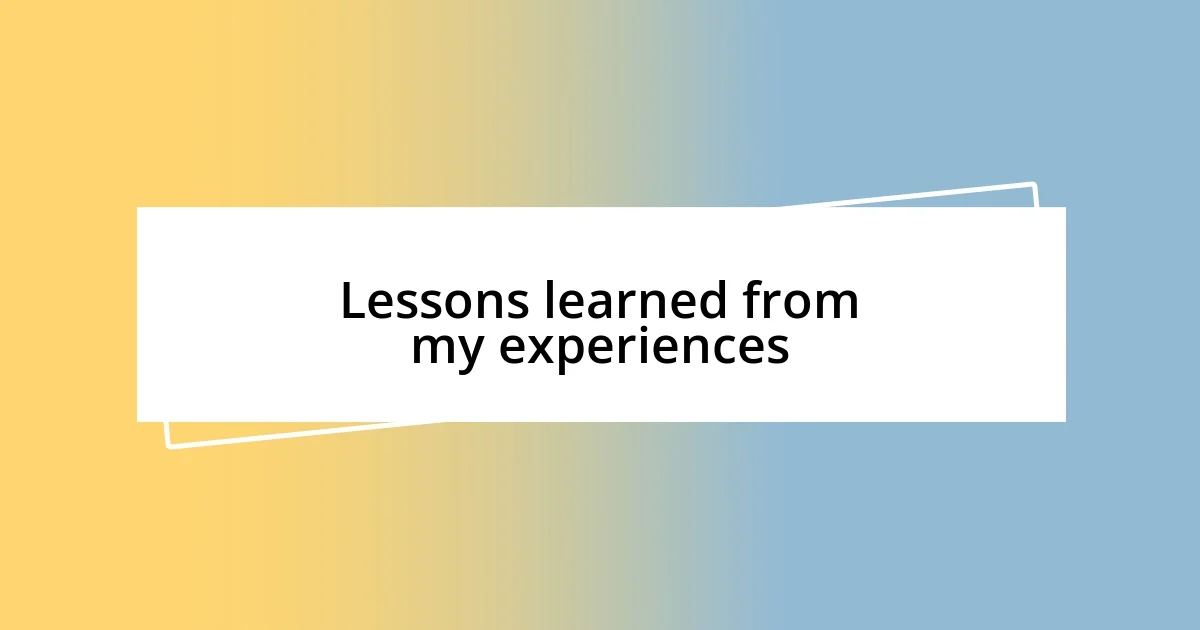
Lessons learned from my experiences
One major lesson I’ve gleaned from my experiences is the value of patience. I remember when I set out to improve my physical health; I wanted to see immediate results. But after a few months, I felt disheartened because progress was slow. It took time for me to realize that meaningful change doesn’t happen overnight. By embracing a gradual approach and celebrating the small victories, I found that my journey became far more fulfilling. Have you ever felt that sense of impatience? It can really test your commitment, but sticking with it is what ultimately pays off.
Additionally, I’ve learned to embrace flexibility in my preservation efforts. There were times when I became so attached to specific routines or goals that I felt defeated whenever life threw me a curveball. I recall a week when unexpected obligations derailed my carefully crafted schedule. Initially, I panicked, feeling like I had to abandon my goals completely. However, I soon realized that adjusting my expectations allowed me to adapt and still care for myself without feeling overwhelmed. How often do we hold ourselves to rigid plans when life demands spontaneity? Flexibility is crucial for maintaining a healthy outlook.
Finally, I’ve discovered that self-compassion is essential. In moments when I face setbacks, the tendency to be critical of myself emerges. One day, after missing an important self-care session, I sat down and reflected on my emotions. Instead of berating myself, I practiced kindness, reminding myself that perfection isn’t the goal—progress is. This practice has made me more resilient and open to growth. Have you tried being kinder to yourself when things don’t go as planned? It can shift your entire perspective.












